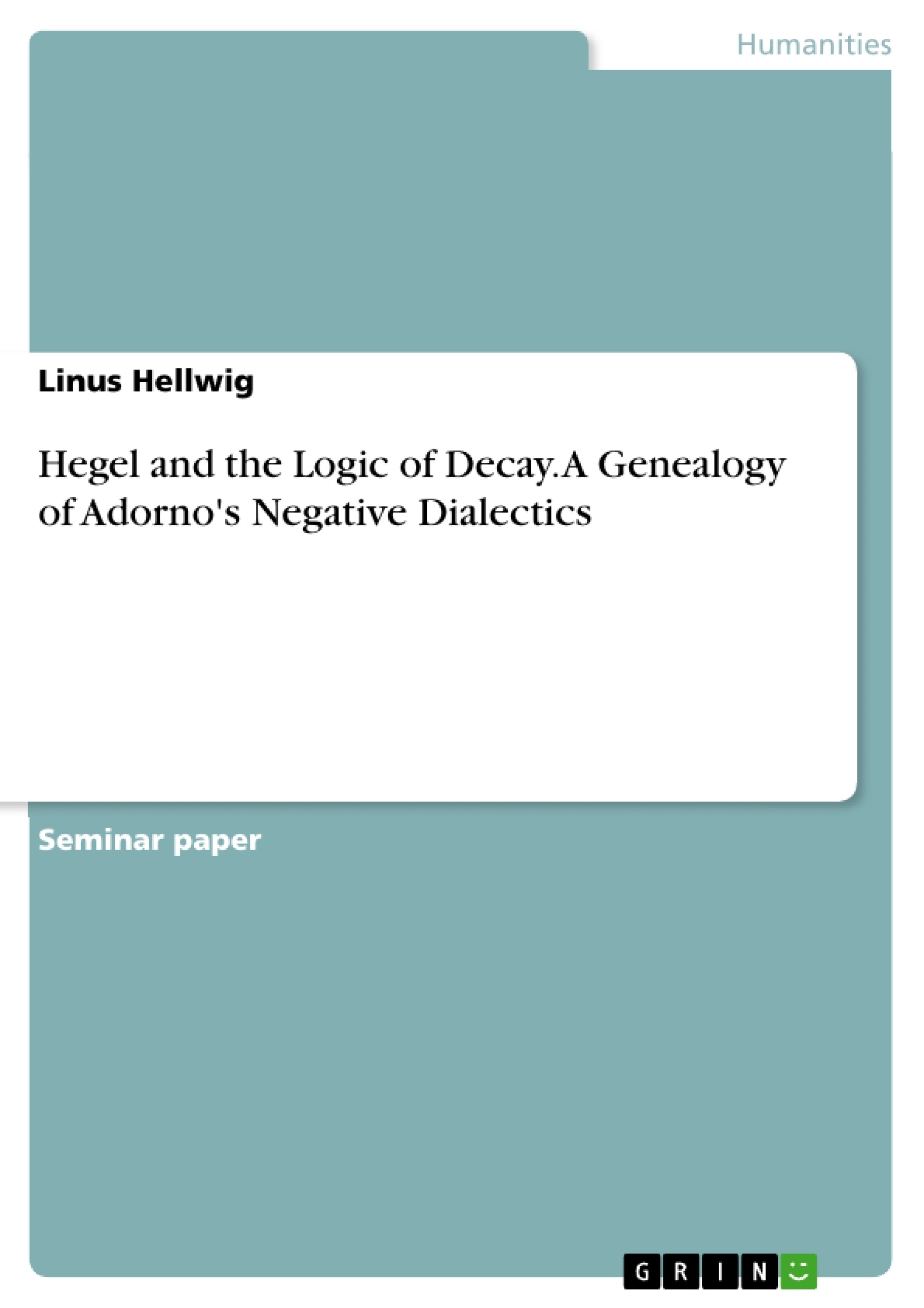In the first essay of the collection Hegel: Three Studies, Adorno evaluates Hegel's philosophy in the following way: "Hegel, in many respects, [is] a Kant who came to himself"1. He justifies this verdict with the claim that Hegel succeeded in following the inner logic of the transcendental philosophy much more consistently than Kant himself. His idealism was not simply imposed on Kant's philosophy and thus using it as a shaky foundation for a foreign superstructure. Instead, Hegel had sensitively reacted to Kant's inherent contradictions and resentments and subsequently presented them coherently in his dialectics and made them usable for him – or one might even say, he ‘sublated’ it. In my examination of the negative dialectics, I have repeatedly come to a similar assessment towards Adorno. He too was able to react productively on the inconsistencies and gross misconceptions in Hegel’s philosophy in his critical approach to Hegel, by which he measured and instructed his own dialectical philosophy on the Hegelian. He was always aware of the danger that the productive reception of Hegelian motifs and dialectical methods would lead to a dull epigonism if it did not consistently align itself with the original contents of his philosophy. In the present work, I would like to prove that Adorno's assessment of the relationship between Hegel and Kant also applies to his relationship to Hegel, i.e. that Adorno can and should be called – in a certain polemic way – a Hegel who came to himself. His negative dialectics convert Hegel's speculative philosophy into the modern philosophical discourse without being guilty of cherry picking. It does so by clearing Hegelian philosophy of its imperfections and enriching it with the political experience of the twentieth century. It is my goal to show with a genealogy of negative dialectics, its reference points to Hegel and to prove that Adorno's dialectic is a legitimate heir of Hegelian philosophy. In addition to Adorno's work Negative Dialectics, I will pay special attention to his Lectures on Negative Dialectics, because, as Adorno states himself, not only the "methodical observation" and the "fundamental considerations" of his negative dialectics are presented there, but also the development process of Negative Dialectics is considered.
Inhaltsverzeichnis (Table of Contents)
- I. Introduction
- II. A Synopsis of Negative Dialectics
- III. Hegel's Heritage
- IV. The Original Sin - Identity and non-identity of the Concept
- V. The >>Logic of Decay«< and double Negation.
- VI. Negative Dialectics and Society.
- VII. Conclusion
Zielsetzung und Themenschwerpunkte (Objectives and Key Themes)
This work aims to demonstrate that Adorno's negative dialectics, a critical approach to Hegel's philosophy, is a legitimate heir of Hegelian thought. It analyzes the relationship between Adorno's philosophy and Hegel's, showing how Adorno builds upon and transcends Hegel's ideas. The text focuses on the development of negative dialectics, its key concepts, and its implications for understanding contemporary society.
- Negative Dialectics and its relation to Hegel's philosophy
- The concept of non-identity in Adorno's dialectic
- The role of the negative in both Hegel's and Adorno's philosophies
- The critique of the identity of being and thinking in Hegel
- The relevance of negative dialectics for contemporary society
Zusammenfassung der Kapitel (Chapter Summaries)
- I. Introduction: This chapter introduces the work's central argument that Adorno's negative dialectics is a continuation of Hegel's philosophy, focusing on Adorno's critical reception of Hegel's ideas. It also outlines the scope and methodology of the work.
- II. A Synopsis of Negative Dialectics: This chapter provides a brief overview of Adorno's negative dialectics, emphasizing its key concepts like non-identity and the critique of reconciliation. It also discusses the development of negative dialectics from Adorno's early work to his later writings.
- III. Hegel's Heritage: This chapter delves into the legacy of Hegel's philosophy for Adorno's negative dialectics. It explores the role of the negative in Hegel's thought and its relation to Adorno's critique of the concept of identity in Hegel.
- IV. The Original Sin – Identity and non-identity of the Concept: This chapter examines Adorno's critique of Hegel's concept of the speculative concept. It contrasts Hegel's view with Kant's notion of the concept, highlighting the inherent contradictions in Hegel's system.
Schlüsselwörter (Keywords)
The main keywords and focus topics of the text include negative dialectics, Hegel, Adorno, non-identity, identity, concept, critique, society, philosophy, and the “logic of decay”. The text explores these concepts through a critical examination of Hegel's philosophy and Adorno's response to it. This analysis sheds light on the relationship between philosophy, social criticism, and the challenges of understanding the complexities of modern society.
Frequently Asked Questions
How does Adorno's Negative Dialectics relate to Hegel's philosophy?
Adorno's negative dialectics is presented as a legitimate heir to Hegel's thought, reacting to its inconsistencies and converting speculative philosophy into a modern discourse.
What is the significance of "non-identity" in this work?
Non-identity is a core concept in Adorno's critique, challenging Hegel's focus on the identity of being and thinking and emphasizing what the concept cannot fully capture.
What does the phrase "Hegel who came to himself" mean?
It is a polemic description of Adorno, suggesting that he followed the inner logic of dialectics more consistently than Hegel did, by clearing it of imperfections and historical misconceptions.
How did the political experience of the 20th century affect Adorno's dialectic?
Adorno enriched Hegelian philosophy with the harsh political realities and social criticisms of his time, moving away from a purely speculative approach.
Why are Adorno's "Lectures on Negative Dialectics" specifically mentioned?
These lectures provide fundamental considerations and show the development process of his main work, offering deeper insight into his methodical observations.
- Quote paper
- Linus Hellwig (Author), 2017, Hegel and the Logic of Decay. A Genealogy of Adorno's Negative Dialectics, Munich, GRIN Verlag, https://www.grin.com/document/437598



